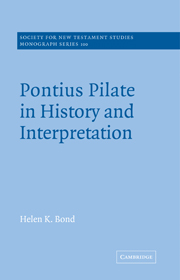Book contents
- Frontmatter
- Contents
- Preface
- Acknowledgements
- Abbreviations
- Map of the Roman province of Judaea, 6–41 ce
- 1 Pontius Pilate and the Roman province of Judaea
- 2 Pilate in Philo
- 3 Pilate in Josephus
- 4 Pilate in Mark's gospel
- 5 Pilate in Matthew's gospel
- 6 Pilate in Luke-Acts
- 7 Pilate in John's gospel
- 8 Historical events behind the gospel narratives
- 9 Conclusion
- Bibliography
- Index of texts cited
- Index of modern authors
- Index of main subjects
8 - Historical events behind the gospel narratives
Published online by Cambridge University Press: 18 December 2009
- Frontmatter
- Contents
- Preface
- Acknowledgements
- Abbreviations
- Map of the Roman province of Judaea, 6–41 ce
- 1 Pontius Pilate and the Roman province of Judaea
- 2 Pilate in Philo
- 3 Pilate in Josephus
- 4 Pilate in Mark's gospel
- 5 Pilate in Matthew's gospel
- 6 Pilate in Luke-Acts
- 7 Pilate in John's gospel
- 8 Historical events behind the gospel narratives
- 9 Conclusion
- Bibliography
- Index of texts cited
- Index of modern authors
- Index of main subjects
Summary
The gospel narratives refer to two incidents involving Pilate – the slaughter of the Galileans in Luke 13.1 and the trial of Jesus of Nazareth in all four. The possible historical events behind these narratives will be discussed in this chapter.
Historical events behind Luke 13.1
Nothing further is known of this incident, either from biblical or non-biblical sources, and the reference to it here in Luke is extremely brief. We are told only that Pilate has mingled the blood of some Galileans with their sacrifices. Since there is no trace of this in the works of Josephus who, as a former commander of Galilee, might be expected to have a particular interest in the fate of Galileans, several scholars have suggested that Luke has misreported another event from first-century Palestine. Virtually all known events from Pilate's term of office have been proposed.
C. H. Kraeling thought that Luke was actually referring to the time when Pilate brought military standards into Jerusalem (JW 2.169–74, Ant. 18.55–9). But, as we saw earlier, that incident led to a relatively peaceful protest in Caesarea which ended without bloodshed. A. T. Olmstead linked Luke 13.1 with the aqueduct protest (JW 2.175–7, Ant. 18.60–2). There is, however, no indication in Josephus that those caught up in the protest were Galileans; the natural assumption is that they were Judaean subjects of Pilate. J. Wellhausen suggested that the incident should be linked to the Samaritan uprising (Ant. 18.86–7).
- Type
- Chapter
- Information
- Pontius Pilate in History and Interpretation , pp. 194 - 202Publisher: Cambridge University PressPrint publication year: 1998



